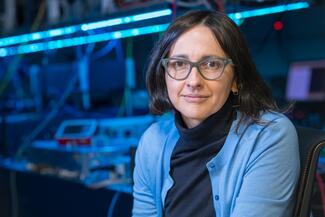
Jelena Vučković investigates Quantum Entanglement within the Soliton Microcomb
Her research lab leveraged their quantum optics background to study the quantum properties of the soliton microcomb.
Excerpted from "Stanford engineers and physicists study quantum characteristics of 'combs' of light"
Professor & Chair Jelena Vučković states, "Many groups have demonstrated on-chip frequency combs in a variety of materials, including recently in silicon carbide by our team. However, until now, the quantum optical properties of frequency combs have been elusive. We wanted to leverage the quantum optics background of our group to study the quantum properties of the soliton microcomb."
While soliton microcombs have been made in other labs, the Stanford researchers are among the first to investigate the system's quantum optical properties, using a process that they outline in a paper published Dec. 16 in Nature Photonics. When created in pairs, microcomb solitons are thought to exhibit entanglement – a relationship between particles that allows them to influence each other even at incredible distances, which underpins our understanding of quantum physics and is the basis of all proposed quantum technologies. Most of the "classical" light we encounter on a daily basis does not exhibit entanglement.
"This is one of the first demonstrations that this miniaturized frequency comb can generate interesting quantum light – non-classical light – on a chip," said Kiyoul Yang, a research scientist in Vučković's Nanoscale and Quantum Photonics Lab and co-author of the paper. "That can open a new pathway toward broader explorations of quantum light using the frequency comb and photonic integrated circuits for large-scale experiments."
Proving the utility of their tool, the researchers also provided convincing evidence of quantum entanglement within the soliton microcomb, which has been theorized and assumed but has yet to be proven by any existing studies.
"I would really like to see solitons become useful for quantum computing because it's a highly studied system," said Melissa Guidry, a graduate student in the Nanoscale and Quantum Photonics Lab and co-author of the paper. "We have a lot of technology at this point for generating solitons on chips at low power, so it would be exciting to be able to take that and show that you have entanglement."
Read full article: Stanford News, "Stanford engineers and physicists study quantum characteristics of 'combs' of light"